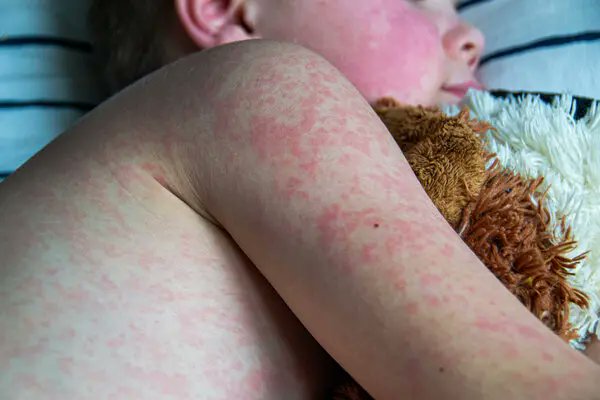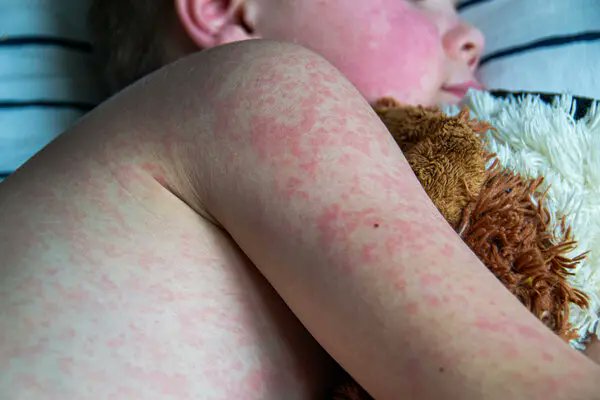BREAKING: Measles Surge 28% in a Week—Vaccination Debate Escalates!
Breaking News: Measles Cases Spike 28% in the U.S. in Just One Week
In a concerning public health development, the United States has witnessed a significant increase in measles cases, with reports indicating a 28% spike in just one week. As of March 28, 2025, a total of 483 measles cases have been documented this year, up from 376 the previous week. This alarming trend raises serious concerns among health experts, particularly regarding vaccination rates among children.
The Current Situation
The rise in measles cases has prompted health officials to sound the alarm, emphasizing the importance of vaccinations in preventing outbreaks. Most of the reported cases have been among children who were not vaccinated, highlighting a critical gap in community immunity. The resurgence of measles, a highly contagious viral disease, poses a significant risk not just to unvaccinated individuals but also to the broader population, particularly those who cannot be vaccinated for medical reasons.
The Importance of Vaccination
Vaccination is a crucial tool in the fight against measles and other preventable diseases. The measles, mumps, and rubella (MMR) vaccine is highly effective, providing immunity to nearly 97% of individuals who receive it. Public health experts stress that maintaining high vaccination rates is essential to achieving herd immunity, which protects those who are unable to be vaccinated, such as infants and individuals with compromised immune systems.
Health Experts’ Concerns
Health experts are warning that if vaccination rates do not improve, the outbreak could continue to grow. The rapid increase in cases serves as a stark reminder of the importance of immunization and the potential consequences of vaccine hesitancy. Public health campaigns are crucial in educating parents about the safety and efficacy of vaccines, as misinformation can significantly impact vaccination rates.
- YOU MAY ALSO LIKE TO WATCH THIS TRENDING STORY ON YOUTUBE. Waverly Hills Hospital's Horror Story: The Most Haunted Room 502
Historical Context of Measles in the U.S.
Measles was declared eliminated in the United States in 2000 due to high vaccination coverage rates. However, the resurgence of cases in recent years has been attributed to declining vaccination rates, often fueled by misinformation about vaccine safety. Outbreaks have been linked to unvaccinated populations, which have become more prominent in various communities across the country.
The Role of Public Health Campaigns
In response to the recent spike in measles cases, public health officials are ramping up efforts to educate communities about the importance of vaccinations. Campaigns aim to dispel myths surrounding vaccines, provide accurate information, and encourage parents to vaccinate their children. Collaboration with healthcare providers, schools, and community organizations is vital in reaching a wider audience and addressing concerns.
Recommendations for Parents
Parents are encouraged to consult with healthcare professionals about the vaccination schedule for their children. The CDC recommends that children receive the first dose of the MMR vaccine between 12 and 15 months of age, followed by a second dose between 4 and 6 years. Staying informed and up-to-date with vaccinations not only protects individual children but also contributes to the health and safety of the entire community.
Conclusion
The recent spike in measles cases in the U.S. underscores the critical need for increased vaccination rates. As health experts warn of the potential for further outbreaks, it is essential for communities to come together to prioritize immunization. By ensuring that children are vaccinated, we can protect not only their health but also the health of those who are vulnerable in our society. It is a collective responsibility to maintain high vaccination rates and prevent the resurgence of preventable diseases like measles.
For more information on vaccination schedules and the importance of immunization, visit the CDC’s official website or consult with your healthcare provider. Keeping our communities safe starts with informed decisions about health and wellness.

BREAKING: MEASLES CASES IN U.S. SPIKE 28% IN JUST ONE WEEK
483 measles cases have been reported in the U.S. this year — up from 376 last week.
Most cases are in children who were not vaccinated.
Health experts warn the outbreak could grow if vaccination rates don’t… https://t.co/Xz1HibWdtJ pic.twitter.com/BaBGHUZGr3
— Mario Nawfal (@MarioNawfal) March 28, 2025
BREAKING: MEASLES CASES IN U.S. SPIKE 28% IN JUST ONE WEEK
Have you heard the latest news? Measles cases in the U.S. have just spiked by a staggering 28% in just one week! That’s right, we’re looking at 483 reported cases this year, a significant jump from the previous count of 376. The majority of these cases are occurring in children who have not been vaccinated. Health experts are sounding the alarm, warning that the situation could worsen if vaccination rates don’t improve.
This surge in measles cases is not just a number; it’s a serious public health concern that affects us all. So, what’s going on? Let’s dive deeper into this alarming trend and explore the implications for our communities, especially for our children.
Understanding Measles and Its Impact
Measles is a highly contagious viral disease that can lead to serious complications, including pneumonia, encephalitis, and even death. It spreads through respiratory droplets when an infected person coughs or sneezes. The virus can remain in the air for up to two hours after the infected person has left the area, making it incredibly easy to transmit, especially in crowded places like schools and daycare centers.
With the recent spike in measles cases, it’s crucial to understand the impact of this disease. For many children and individuals with weakened immune systems, contracting measles can lead to severe health complications. The Centers for Disease Control and Prevention (CDC) notes that measles can cause serious health issues, especially in unvaccinated populations.
Why Vaccination Matters
Vaccination is the most effective way to prevent measles. The measles, mumps, and rubella (MMR) vaccine is safe and effective, providing long-lasting immunity. Vaccination not only protects the individual but also helps to create herd immunity, which is essential for protecting those who cannot be vaccinated, such as infants and individuals with certain medical conditions.
Despite the overwhelming evidence supporting vaccines, misinformation continues to spread, leading to decreased vaccination rates in some communities. This decline in vaccination coverage is a significant factor contributing to the current outbreak. Health experts warn that if vaccination rates do not improve, we could see even more cases of measles in the coming weeks and months.
The Role of Community Awareness
Community awareness plays a vital role in controlling outbreaks like this one. Parents, caregivers, and community leaders need to work together to promote the importance of vaccination. Schools can play a crucial part by providing resources and information about vaccines, dispelling myths, and encouraging parents to vaccinate their children.
Social media platforms and community forums can also be effective tools for sharing accurate information about vaccines and addressing concerns. Engaging in open, honest discussions can help alleviate fears and misconceptions surrounding vaccination.
What Can You Do?
If you’re a parent or guardian, now is the time to check your child’s vaccination status. Ensure they are up to date with their MMR vaccinations. If you have concerns about vaccines, consider discussing them with a healthcare provider who can provide evidence-based information tailored to your situation.
For those in the community, advocating for vaccination and spreading awareness can make a difference. Share reliable information from trusted sources like the CDC or the World Health Organization (WHO) to counteract misinformation. Encourage friends and family to discuss vaccinations with their healthcare providers.
Monitoring the Situation
As we continue to monitor this situation, it’s essential to stay updated on the latest information from health authorities. Outbreaks can develop quickly, and public health officials are working tirelessly to contain the spread of measles.
Following reliable news sources and public health announcements can keep you informed about the situation in your area. In addition, local health departments often provide updates on vaccination clinics and community health initiatives.
Community Health Programs and Initiatives
Many communities are stepping up to tackle the vaccination issue head-on by organizing health fairs, vaccination drives, and educational workshops. These initiatives aim to increase awareness and provide accessible vaccination options to families.
Participating in or supporting these community health programs can make a significant impact. Not only do they help ensure that more children are vaccinated, but they also foster a sense of community responsibility for public health.
Conclusion: A Call to Action
The recent spike in measles cases is a stark reminder of the importance of vaccination and public health awareness. As community members, we all have a role to play in combating misinformation and ensuring the health and safety of our children.
By promoting vaccination, staying informed, and supporting community health initiatives, we can help prevent further outbreaks and protect our most vulnerable populations. Let’s work together to ensure that our communities remain safe and healthy for everyone, especially our children.
For more information on measles and vaccination, visit the [CDC website](https://www.cdc.gov/measles/index.html) for resources and guidelines. It’s time to take action and make sure we’re doing everything we can to protect our loved ones and our communities.

